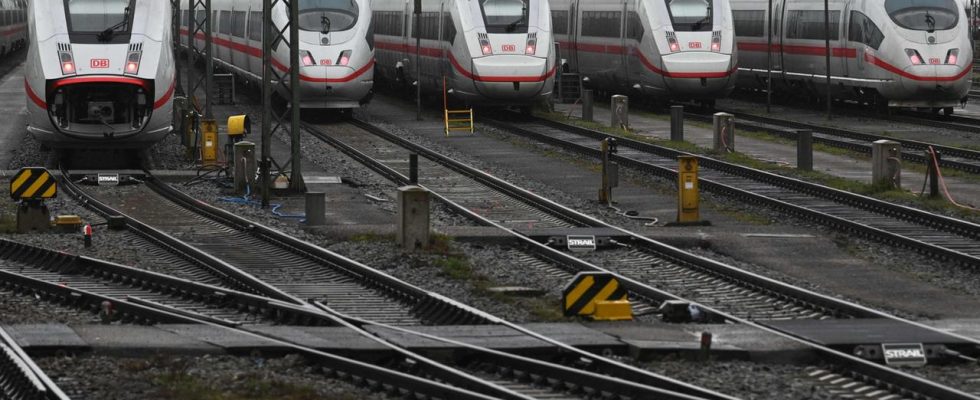Nothing works in long-distance rail traffic from late Sunday evening: During the warning strike by the EVG union, all IC and ICE trains are stopped until Tuesday night. According to Bahn, train traffic should still run as planned at the weekend.
Due to the warning strike announced by the EVG union, Deutsche Bahn will completely stop all long-distance traffic for around two days from Sunday evening. From Sunday evening at 10 p.m. to Tuesday night at midnight, all ICE and IC trains remained in the depots, the group said. Even in regional transport, “mostly no trains will run during the strike”.
Train: Train service on weekends according to plan
However, Deutsche Bahn does not expect the warning strike to have any significant impact on train traffic before Sunday evening, the group said. “From what I know now, I would definitely want to see Sunday as safe for traffic,” said HR Director Martin Seiler. From Monday, however, the warning strike will have “significant effects”.
“All passengers who want to postpone their trip planned for May 14th to 16th due to the EVG strike can now use their long-distance ticket booked up to and including May 11th flexibly up to and including Sunday evening,” said the railway .
Europe-wide impairments of cargo transport
The long walkout will also have noticeable consequences and thus also economic effects in the cargo area, it said. The railways confirmed that they expect significant effects on pan-European freight traffic. Six out of ten European freight corridors used the German rail network.
EVG: Discussions are not progressing
The railway and transport union (EVG) had previously announced a nationwide 50-hour warning strike in long-distance, regional and freight transport in the ongoing wage dispute with Deutsche Bahn, from Sunday evening, 10:00 p.m. to Tuesday, 12:00 a.m. The warning strike should affect Deutsche Bahn, but also almost all of the approximately 50 other railway providers, according to the EVG.
The union justified the call for widespread work stoppages in all areas with the sluggish talks that have been going on for more than two months. “We will therefore once again clearly signal that the existing offers have to be significantly improved,” said EVG collective bargaining board member Cosima Ingenschay.
Since little is happening at the negotiating tables, there is now another strike.
Loroch: “No other choice”
Negotiator Kristian Loroch added: “We’re going on strike for a total of 50 hours, which increases the pressure significantly because the employers don’t give us any other choice.”
Loroch said: “Of its own conviction, Deutsche Bahn does not seem to want to submit a negotiable offer, obviously considerable pressure is required. That is why we are now setting a new emphasis.”
Bahn: EVG does not want to negotiating table
Bahn personnel director Seiler criticized the labor dispute as “insane” and “completely excessive”. He said: “Instead of looking for compromises, the EVG wants to paralyze the country for an unbelievable 50 hours.”
This is like a full strike without a ballot.
Seiler accused the EVG of not being willing to negotiate. But they are asked to do just that. The railway is now ready for talks – even over the weekend, explained Seiler.
The railways have “fulfilled the union’s central demand for the minimum wage” and “by no means” suggested a cap of 13 euros, explained Seiler. The offer of a ten percent wage increase and the full inflation compensation premium are also already on the table.
Already the third warning strike
Already at the end of March, the EVG, together with the service union ver.di, had largely paralyzed traffic in Germany. At the end of April, the EVG followed up with an eight-hour warning strike. The union negotiates for around 230,000 workers.
Deutsche Bahn wants to orientate itself towards the end of the public service. In talks with the industry, the union is demanding, among other things, at least 650 euros more per month or twelve percent for upper income earners – for a period of twelve months.
Before that, however, she wants to know that crucial questions about the minimum wage have been clarified in the negotiations with the railways. Around 2,000 employees at DB have so far only received this through allowances because the minimum wage has risen faster than the tariff tables in recent years. The EVG would like to include the statutory minimum wage of twelve euros in the tables before negotiating further tariff increases.
Bahn wants more than twice as long running time
The offer from the state-owned company includes a total of around ten percent more wages for lower and middle incomes, eight percent more money for higher incomes and an additional 2850 euros inflation compensation premium for everyone. When it comes to the term, the group has completely different ideas than EVG. Deutsche Bahn is aiming for a period of 27 months, which is more than twice as long.
The first stage of wage increases in the tables should not take effect until March 2024. By then, the offered inflation compensation should be paid out over several months. Recently, the railways of the EVG accommodated in anchoring the minimum wage in the tariff tables, but the union considers this to be insufficient.

